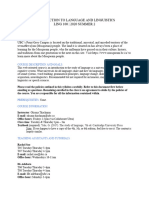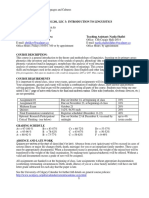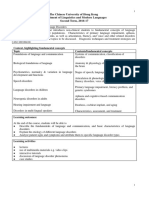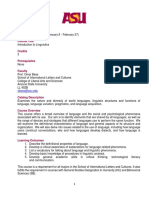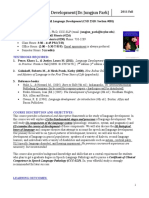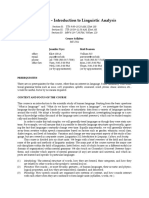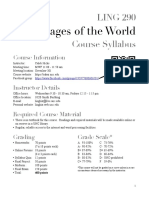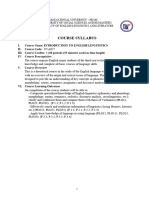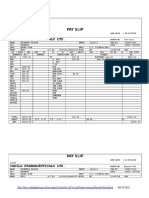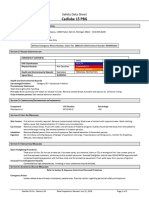LING/PSYC 370B: Child Language
Acquisition
Spring 2025
Instructor: Gabrielle Manning
Contact: gabriellemanning@uvic.ca
Office hours: Thursday, 11:30am-1:00pm
Link: https://uvic.zoom.us/j/81333761306?pwd=UGpAl6LSorilYDToei7EJh97UWmmv1.1
Meeting ID: 813 3376 1306
Password: 098171
TA: Alex Loggie
Contact: alexanderloggie@uvic.ca
Office hours: By appointment
Class time and date: Monday & Thursday, 10-11:20am
Class information: Synchronous lectures on Zoom
Zoom: https://uvic.zoom.us/j/83051505674?pwd=yflxaWRXiMiVcKbi6f4mJtSDS29mva.1
Meeting ID: 830 5150 5674
Password: 300231
Course description
This course is designed to provide students with a comprehensive understanding of language
development throughout childhood. Topics include the acquisition of phonology (the sound system
of a language), syntax (sentence structure), morphology, (the structure of words), and pragmatics
(language use). We will cover different theories and topics of language acquisition in relation to
monolingual and bilingual children, as well as children with language learning impairments.
Prerequisites
LING 370B: None
PSYC 370B: PSYC 100A and PSYC 100B
Required reading material
Textbook
The Development of Language (10th edition) - Berko Gleason & Bernstein Ratner
Articles
All required articles can be found on Brightspace.
Goodwin, C., & Lilo-Martin, D. (2023). Deaf and hearing American Sign Language-English
bilinguals: Typical bilingual language development. Journal of Deaf Studies and Deaf
Education, 28, 350-362.
1
�Kuhl, P. K., Andruski, J. E., Chistovich, I. A., Chistovich, L. A., Kozhevnikova, E. V., Ryskina,
V.L., … Lacerda, F. (1997). Cross-language analysis of phonetic units in language
addressed to infants. Science, 277(5326), 684–686.
Ramírez, N. F., Weiss, Y., & Sheth, K. K. (2024). Parentese in infancy predicts 5-year language
complexity and conversational turns. Journal of Child Language, 51(2), 359-384.
Smith, L., & Yu, C. (2008). Infants rapidly learn word-referent mappings via cross-situational
statistics. Cognition, 106(3), 1558–1568.
Van Heugten, M., & Christophe, A. (2015). Infants’ acquisition of grammatical gender
dependencies. Infancy, 20(6), 675-683.
Woodard, K., Gleitman, L. R., & Trueswell, J. C. (2016). Two- and three-year-olds track a
single meaning during word learning: Evidence for propose-but-verify. Language Learning
and Development, 12(3), 252–261.
Evaluations
Article summary and critique 15%
Assignments 30%
CHILDES analysis 15%
Midterm 35% 35%
Final exam 35% 35%
Midterm
The midterm will be completed on Brightspace. Tests can consist of multiple choice, true or false,
and short answer questions. All tests are to be completed during class time. Once you have started
you will have 90 minutes to complete it. If you run into any technical difficulties, let me know
immediately.
Assignments
All assignments should be submitted through Brightspace. Late work will be penalized 5% per day
unless a valid justification is provided. Valid justifications include situations such as illness, birth,
death, marriage, and religious holidays (you may be asked to provide documentation).
Important dates
January 22: Last day for adding courses
February 28: Last day for dropping courses without penalty of failure
2
� Course Plan
WEEK DATE TOPIC READING IMPORTANT NOTES
JAN. 6 Introduction/syllabus
WEEK 1 Linguistic principles and Woodard et al.
JAN. 9
reading research papers (2016)
JAN. 13 Issues, theories, and
WEEK 2 CH. 7
JAN. 16 methods
JAN. 20
WEEK 3 Biological bases CH. 1(pg. 19 – 28)
JAN. 23
JAN.27 Kuhl et al. (1997)
WEEK 4 Language input
JAN. 30 Ramírez et al. (2024)
FEB. 3 Phonetic – phonological
WEEK 5 CH. 3
FEB. 6 development ASSIGNMENT 1 DUE
FEB. 10 Smith & Yu
(2008)
WEEK 6 Lexical Development
FEB. 13 van Heugten &
Christophe (2015)
FEB. 17
WEEK 7 NO CLASS – FAMILY DAY AND READING BREAK
FEB. 20
FEB. 24 MIDTERM
WEEK 8
FEB. 27 Morphological and
CH. 5 (to pg. 153)
MAR. 3 syntactic development
WEEK 9 Language development and
MAR. 6
cognition
MAR. 10 Atypical language
WEEK 10 CH. 9
MAR. 13 development
MAR. 17 ASSIGNMENT 2 WORK
WEEK 11
MAR. 20 CH. 11
Bilingualism Goodwin & Lilo-
MAR. 24 Martin (2023)
WEEK 12
MAR. 27 Later language ASSIGNMENT 2 DUE
CH 5. (pg. 153 – end)
MAR. 31 development
WEEK 13
APR. 3 Wrap-up and exam review
Territorial acknowledgements
We acknowledge and respect the lək̓ʷəŋən peoples on whose traditional territory the university
stands and the Songhees, Esquimalt and W̱SÁNEĆ peoples whose historical relationships with the
land continue to this day.
Academic policies
Questions?
If you have questions about anything relating to the course, feel free to drop into my office hours.
If the timing for my office hours do not work well for you, please e-mail me. I can arrange to either
meet with you via Zoom or if possible, I will respond via e-mail. When sending an e-mail, please
use your university e-mail address for all correspondence. Include the course code in the subject
3
�line and your full name at the end of your e-mail, there is risk of your email getting lost if this
information is not included. I will respond within 2 business days (excluding weekends). If you
have questions about the Linguistics program in general, please contact the Undergraduate
Advisor.
Attendance and course material
It is your responsibility to attend class, participate in the various learning and assessment activities,
and complete the assigned readings for this course. You are responsible for the material in all
assigned readings, even if it is not explicitly covered in class.
Attendance is important. Students who cannot attend due to illness are asked to notify their
instructors immediately. If illness, accident, or family affliction causes a student to miss the final
exam or to fail to complete any assignment by the end of the term students are required to submit
a request for academic concession.
Policies regarding undergraduate student academic concessions and deferrals are also detailed on
the Undergraduate Records. Students must submit a Request for Academic Concession.
Accessibility and capturing of video content
Auto-generated transcription and captioning is enabled in this course. Please be aware that
automated transcription and captioning is at best 70-90% accurate and by nature will include error.
This depends on the subject matter, speaker, audio quality etc. Words prone to error include
specialized terminology and proper names. Students are asked to refer to the audio feed for
clarification of any errors. If you find transcription or captioning that is offensive, please contact
me so that I am aware. If you require captions as part of an academic accommodation, please
contact CAL.
Academic integrity
Students are required to abide by all academic regulations set as set out in the University calendar,
including standards of academic integrity. Violations of academic integrity (e.g., cheating and
plagiarism) are considered serious and may result in significant penalties. For more information
see the Academic Calendar (link below).
Copyright
All course content and materials are made available by instructors for educational purposes and
for the exclusive use of students registered in their class. The material is protected under copyright
law, even if not marked with a ©. Any further use or distribution of materials to others requires
the written permission of the instructor, except under fair dealing or another exception in the
Copyright Act. Violations may result in disciplinary action under the Resolution of Non-Academic
Misconduct Allegations policy (AC1300).
Online conduct
The University of Victoria is committed to promoting critical academic discourse while providing
a respectful and supportive learning environment. All members of the university community have
the right to this experience and the responsibility to help create such an environment. The
University will not tolerate racism, sexualized violence, or any form of discrimination, bullying or
harassment.
4
�Please be advised that, by logging into UVic’s learning systems or interacting with online
resources, and course-related communication platforms, you are engaging in a university activity.
All interactions within this environment are subject to the university expectations and policies.
Any concerns about student conduct may be reviewed and responded to in accordance with the
appropriate university policy. To report concerns about online student conduct:
onlineconduct@uvic.ca
Mental health
A note to remind you to take care of yourself. Diminished mental health can interfere with optimal
academic performance. Do your best to engage in self-care and maintain a healthy lifestyle this
semester. This will help you achieve your goals and cope with stress. All of us benefit from support
during times of struggle. You are not alone. The source of symptoms might be related to your
course work; if so, please speak with me. However, problems with other parts of your life can also
contribute to decreased academic performance. The UVic Student Wellness Centre provides cost-
free and confidential mental health services to help you manage personal challenges that impact
your emotional or academic well-being.
University of Victoria Students’ Society (UVSS)
The UVSS is a social justice based non-profit run by students, for students and is entirely separate
from UVic. As an undergraduate student, you are already a member! We work on issues affecting
students such as affordability, public transit, sexualized violence, sustainability, student
employment, and much more. We fund clubs and course unions and have several advocacy groups.
We also have a Food Bank and Free Store, a Peer Support Centre, and run your health and dental
plan. We are here to support you, so please reach out to us at uvss.ca!
Some useful links
Undergraduate Calendar: https://www.uvic.ca/calendar/undergrad/index.php
Academic accommodations: https://www.uvic.ca/services/cal/programs/academic/index.php
Academic concessions: https://www.uvic.ca/registrar/students/appeals/acad-
concession/index.php





